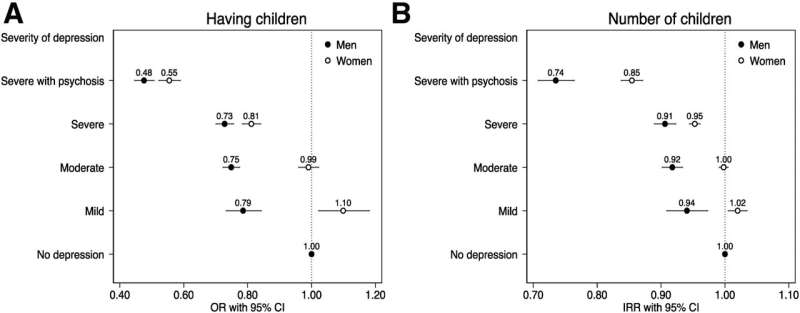People with depression are less likely to have children, suggests study

Women are at their greatest risk for depression during their childbearing years, and according to a recent study published in American Journal of Obstetrics and Gynecology, depression is indeed associated with a lower likelihood of having children among men and women.
Drawing on the unique Finnish register data, this study with over 1.4 million participants examined the associations between diagnosed depression and the likelihood of having children, the number of children, and the age at first birth for all men and women born in Finland between 1960 and 1980.
"One of the main results was that depression was associated with a lower likelihood of having children and a lower number of children among men and women. Depression was also linked to a slightly lower age at first birth," says principal investigator Kateryna Golovina from the Helsinki Collegium for Advanced Studies.
Men with even mild depression have a lower likelihood of having children
Men diagnosed with depression had 33% lower odds of having a child compared to men without depression; women diagnosed with depression had 15% lower odds of having a child than women without depression.
An important observation was that the severity of depression was associated with a likelihood of having children: for men, even mild depression was related to a lower likelihood of having children, whereas for women the link was found only for severe depression.
Socioeconomic differences in the association between depression and the likelihood of having children
The study further examined whether there were any educational differences in the association between depression and the likelihood of having children.
"Among men and women with secondary and higher education, depression was related to a lower likelihood of having children and having fewer children. As for the participants with basic education, no associations were observed for men, whereas for women depression was related to a higher likelihood of having children," says Kateryna Golovina.
Early prevention and on-time treatment of depression are crucial
The findings have clinical implications, suggesting that depression is one of the factors contributing to the likelihood of having children, which is why early prevention and on-time treatment of depression are crucial.
For example, timely screening for depression can be implemented by increasing the availability of mental health professionals or it can be done by obstetrician-gynecologists and women's health providers. For men, the severity of depression should be considered, given that already milder depression may have more negative health and behavioral effects for them compared to women.
"Overall, our results give another motivation to provide accessible mental health services to young people and implement low-threshold interventions and therapies," states Professor Marko Elovainio from the Faculty of Medicine.
More information: Kateryna Golovina et al, Association between depression and the likelihood of having children: a nationwide register study in Finland, American Journal of Obstetrics and Gynecology (2022). DOI: 10.1016/j.ajog.2022.10.016


















